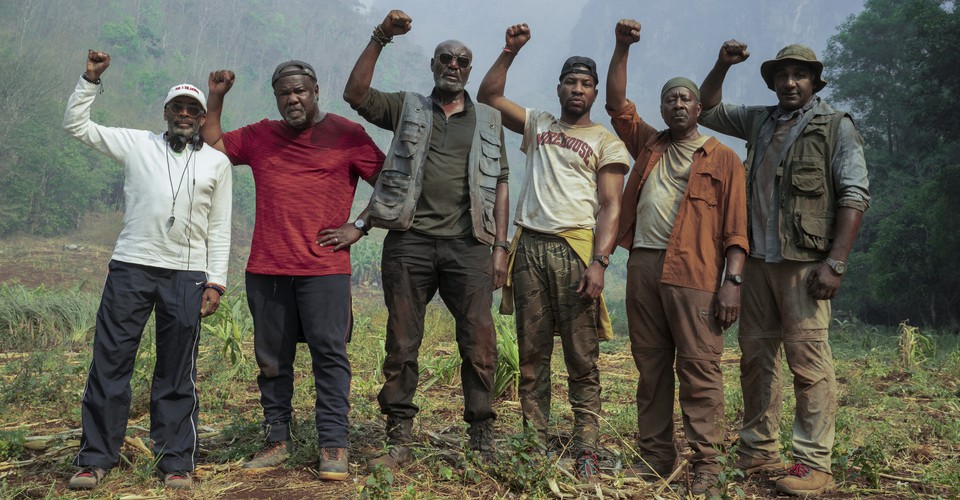Spike Lee is known for his social commentary, especially dealing with the issues of racial inequality and racism towards black people. This film is no exception, yet it targets these issues through a lens that is not often considered when discussing them. Lee creates a film about the struggle of black Americans by telling us a war story about black veterans of the Vietnam War. The film opens with a montage of real footage from the tumultuous time in which America found itself in the midst of the Civil Rights Movement and the Vietnam War. We see clips of black civil rights leaders and members, as well as war footage, and lots of images of violence and death. Lee chooses to show violence perpetrated towards both black Americans and Vietnamese people, highlighting immediately the connection between the two groups. Throughout the rest of the movie, these two groups view each other as their enemies, despite this first connection the audience is shown.
The main portion of the film follows a group of black veterans, who return to Vietnam as old men, in order to search for the location of their fallen leader, Stormin’ Norman (Chadwick Boseman), and a chest of gold that had been left behind. Often interrupting this main narrative is a sub-narrative following the unfortunate events that led to Stormin’ Norman’s death, the catalyst for these main events. Along the way, these veterans deal with personal issues and cultural issues.
One fascinating recurring motif throughout the film is a “Make America Great Again” hat. It is a running joke that Paul (Delroy Lindo) is a Trump supporter, which causes some tension within the group of veterans. In an interview with The Atlantic, Lee and the writers of the film discuss the process of making the film. Lee comments on the MAGA hat, saying, “black people are not one monolithic group; we don’t all think alike, look alike” (Sims). He then talks about the bonds that soldiers form during war are solid, but once the war is over, the soldiers go their own way.
Kevin Wilmott, Lee’s writing partner, noted that the MAGA hat, “is almost like a horror-movie motif; it’s the transference of evil.” Wilmott discusses the original draft of the script, which was not always a film about the experience of black veterans. The “Paul” character was always written similarly to a Trump supporter, with an attitude that he had been ripped off. Lee and Wilmott kept that attitude when they went through rewrites of the script and the MAGA hat stayed as that symbol. It’s an unexpected connection to make, comparing a black veteran who feels as if the world hasn’t been fair to him, and a Trump supporter who feels the same. Making one character share these qualities helps to show how similar opposing sides can be.

In my favorite scene of the film (spoilers to follow), Paul confronts an angelic vision of his old commander, Stormin’ Norman. At this point in the film, Paul has lost his mind. The trauma of his past experiences in the war have affected his current wellbeing, and he has become manic, obsessed, and crazed. His confrontation with Stormin’ Norman reveals to us that he is responsible for Norman’s death, as a result of accidental friendly fire. Paul has taken this knowledge and let it build up inside him until it breaks him. The angelic vision of Norman pulls Paul into an embrace and forgives him.
The emotion of this scene is heightened by the unfortunate recent passing of Chadwick Boseman. In the interview with The Atlantic, Lee talks about the casting of Boseman. “This character is heroic; he’s a superhero. Who do we cast? We cast Jackie Robinson, James Brown, Thurgood Marshall, and we cast T’Challa. Chad is a superhero! That character is Christlike!” Lee is referencing many of Boseman’s most famous roles, notably black historical icons, as well as the most popular black superhero of all time. Chadwick Boseman passed away at the age of 43 on August 28, 2020. Though Boseman does have one other unreleased project on the way, Da 5 Bloods seems like a fitting close to his filmography. As an actor who gained fame playing black icons, a role in which he plays a Christlike black icon to this group of veterans, in a film made by one of the icons of black cinema, it seems to be a perfect capstone on his short, yet marvelous career.
Works Cited:
Sims, David. "The Long, Strange Journey Of 'Da 5 Bloods' ." 17 June 2020. Web. 08 Sept. 2020.


 RSS Feed
RSS Feed
